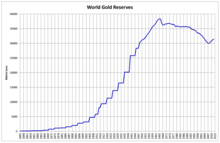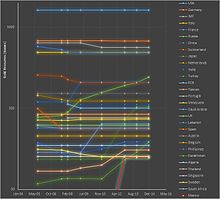Gold reserve





A gold reserve was the gold held by a national central bank, intended mainly as a guarantee to redeem promises to pay depositors, note holders (e.g. paper money), or trading peers, during the eras of the gold standard, and also as a store of value, or to support the value of the national currency.
The World Gold Council estimates that all the gold ever mined totaled 187,200 metric tons in 2017[1] but other independent estimates vary by as much as 20%.[2] At a price of US$1,250 per troy ounce, reached on 16 August 2017, one tonne of gold has a value of approximately US$40.2 million. The total value of all gold ever mined would exceed US$7.5 trillion at that valuation and using WGC 2017 estimates.[note 1]
Wartime relevance
During most of history, a nation's gold reserves were considered its key financial asset and a major prize of war.
A typical view was expressed in a secret memorandum by the British Chief of the Imperial General Staff from October 1939, at the beginning of World War II. The British Military and the British Secret Service laid out "measures to be taken in the event of an invasion of Holland and Belgium by Germany" and presented them to the War Cabinet:
It will be for the Treasury in collaboration with the Bank of England, and the Foreign Office, to examine the possible means of getting the bullion and negotiable securities into the same place of safety. The transport of many hundreds of tons of bullion presents a difficult problem and the loading would take a long time. The ideal would of course be to have the gold transferred to this country or to the United States of America. [...] The gold reserves of Belgium and Holland amount to about £70 million and £110 million respectively. [Foot]Note: H. M. Treasury has particularly requested that this information, which is highly confidential should in no circumstances be divulged. The total weight of this bullion amounts to about 1800 tons and its evacuation would be a matter of the utmost importance would present a considerable problem if it had to be undertaken in a hurry when transport facilities were disorganized. At present this gold is believed to be stored at Brussels and The Hague respectively, neither of which is very well placed for its rapid evacuation in an emergency.[3]
The Belgian government rushed to ship the gold to a safe place: Dakar, the capital of Senegal, then part of the French colonial empire. After the Germans occupied Belgium and France in 1940, they demanded the Belgian gold reserve back. In 1941, Vichy French officials arranged the transport of 4,944 boxes with 198 tons of gold to officials of the German Reichsbank.[4]
IMF holdings
Since early 2011, the gold holdings of the IMF have been constant at 90.5 million troy ounces (2,814.1 metric tons).[5]
Officially reported holdings
The IMF regularly maintains statistics of national assets as reported by various countries.[6] This data is used by the World Gold Council to periodically rank and report the gold holdings of countries and official organizations.
On 17 July 2015, China announced that it increased its gold reserves by about 57 percent from 1,054 to 1,658 metric tons, while disclosing its official gold reserves for the first time in six years.[7][8]
The gold listed for each of the countries in the table may not be physically stored in the country listed, as central banks generally have not allowed independent audits of their reserves. Gold leasing by central banks could place into doubt the reported gold holdings in the table below.[9]
| Rank | Country/Organization | Gold holdings (in metric tons) |
Gold's share of forex reserves |
|---|---|---|---|
| 1 | 8,133.5 | 73.5% | |
| 2 | 3,369.8 | 68.9% | |
| — | International Monetary Fund | 2,814.0 | N/A |
| 3 | 2,451.8 | 65.3% | |
| 4 | 2,436.0 | 58.5% | |
| 5 | 1,998.5 | 16.8% | |
| 6 | 1,842.6 | 2.2% | |
| 7 | 1,040.0 | 5.0% | |
| 8 | 765.2 | 2.4% | |
| 9 | 612.5 | 65.9% | |
| 10 | 573.1 | 5.5% | |
| — | 504.8 | 25.9% | |
| 11 | 423.6 | 3.4% | |
| 12 | 382.5 | 66.3% | |
| 13 | 326.4 | 41.1% | |
| 14 | 323.1 | 2.4% | |
| 15 | 310.3 | 7.8% | |
| 16 | 286.8 | 19.7% | |
| 17 | 281.6 | 16.0% | |
| 18 | 280.0 | 47.0% | |
| 19 | 227.4 | 33.8% | |
| 20 | 197.9 | 10.0% | |
| 21 | 173.6 | 6.7% | |
| 22 | 164.2 | 65.6% | |
| 23 | 154.0 | 2.9% |
See also
- Gold Reserve (company)
- Black Friday (1869) -- Also referred to as the Gold Panic of 1869
- Federal Reserve Bank of New York
- Gold as an investment
- Gold repatriation
- Gold reserves of Norway
- Gold reserves of the United Kingdom
- Gold standard
- List of countries by gold production
- Moscow gold, the reserves of the Bank of Spain sent to the Soviet Union during the Spanish Civil War
- Peak gold
- Romanian Treasure, the Romanian gold reserves sent (alongside other valuable objects) to Russia for safekeeping during World War I, but never returned
- Silver as an investment
- Strategic Petroleum Reserve (United States)
- United States Bullion Depository, often known as Fort Knox
- Vaulted gold
Notes
- ^ One tonne is equal to approximately 32,150.75 troy ounces. Gold, silver, & other precious metals & gems are weighed by the troy ounce: 12 troy ounces = 1 troy pound (and not 16 to 1 as in the avoirdupois weight system)
References
- ^ "How much gold has been mined?", World Gold Council
- ^ "How much gold is there in the world?" by Ed Prior, BBC News, 1 April 2013
- ^ Memorandum by War Cabinet Secretary E. E. Bridges from October 6, 1939, Secret: Holland and Belgium: Measures to be taken in the event of an invasion by Germany. P. 1 and 4. The National Archives (United Kingdom)
- ^ "Belgian gold in foreign hands". Museum of the National Bank of Belgium. 4 March 2010. Retrieved 19 January 2016.
- ^ "Gold in the IMF". International Monetary Fund. Archived from the original on April 22, 2011.
{{cite web}}: Unknown parameter|deadurl=ignored (|url-status=suggested) (help) - ^ "Data Template on International Reserves and Foreign Currency Liquidity -- Reporting Countries".
- ^ "Gold & Foreign Exchange Reserves".
- ^ "Major Factors Affecting Gold Prices Fluctuation". FXdailyReport.Com. 2016-07-22. Retrieved 2016-10-28.
- ^ "- Sprott Global Resource Investments Ltd".
- ^ "Research - World Gold Council".
- ^ "World Official Gold Holdings as of October 2018".
- ^ "Gold Demand Trends - World Gold Council".
- ^ "Russian Central Bank Buys More Gold in Face of Tougher Sanctions". 22 August 2018. Retrieved 14 September 2018.
